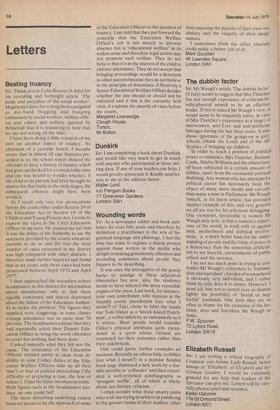Beating truancy
Sir: Thank you to Cohn Brewer (8 July) for his revealing and forthright article 'The pride and prejudice of the social worker'. Magistrates have for so long been castigated as die-hard flogging and hanging enthusiasts by social workers, welfare officers and others and politely ignored by Whitehall that it is reassuring to hear that we are not wrong all the time.
I have been doing a little research of my own on another aspect of truancy. As chairman of a juvenile bench, I became aware that in almost all case histories presented to us, the school report showed the offender to have a history of truancy which had gone unchecked for a considerable time and one was bound to wonder whether, if the child or its parents had been brought to answer for that laxity in the early stages, the subsequent offences might have been avoided.
As I recall only very few prosecutions before the court either under Section 39 of the Education Act or Section 19 of the Children and Young Persons Act, I wrote to express my views to the Chief Education Officer in my area. He assured me (a) that• it was the policy of his Authority to use the sanctions provided by the courts whenever possible to do so and (b) that the total number of cases processed in my district was high compared with other districts. I therefore made further inquiries and found that in my court, only three cases had been prosecuted between April 1974 and April 1977.
I then approached the secondary school headmasters in this district for information about absenteeism, only to find them equally concerned and indeed depressed about the failure of the Education Authority to tackle the problem. The figures they supplied were staggering; in some classes average attendance was no more than 70 percent. The headmasters told me that they had repeatedly asked their District Education Officer to bring the worst offenders to court but nothing had been done.
I asked naturally what they felt was the cause. The reluctance of the Education Officers seemed partly to stem from inability to cope ('other duties of the Education Welfare Officers take up all their time') or fear of judicial proceedings ('the difficulty of preparing a case, the fear of failure'). I find the latter incomprehensible. With figures such as the headmasters produce, no one could fail!
The more disturbing underlying reason however seems to be the Approach of some
of the Education Officers to the question of truancy. I am told that they put forward the principle that the Education Welfare Officer's job is not merely to prevent absence but is 'educational welfare' in its widest sense and therefore legal action may not promote such welfare. They do not believe that it is in the interest of the child to enforce attendance. They do not accept that bringing proceedings would be a deterrent to other parents because they do not believe in the principle of deterrence. Effectively a Senior Educational Welfare Officer decides whether the law should or should not be enforced and if this is the currently held view, it explains the paucity of cases before the courts.
Margaret Liversedge Clough House, Turton, Nr Bolton.


































 Previous page
Previous page